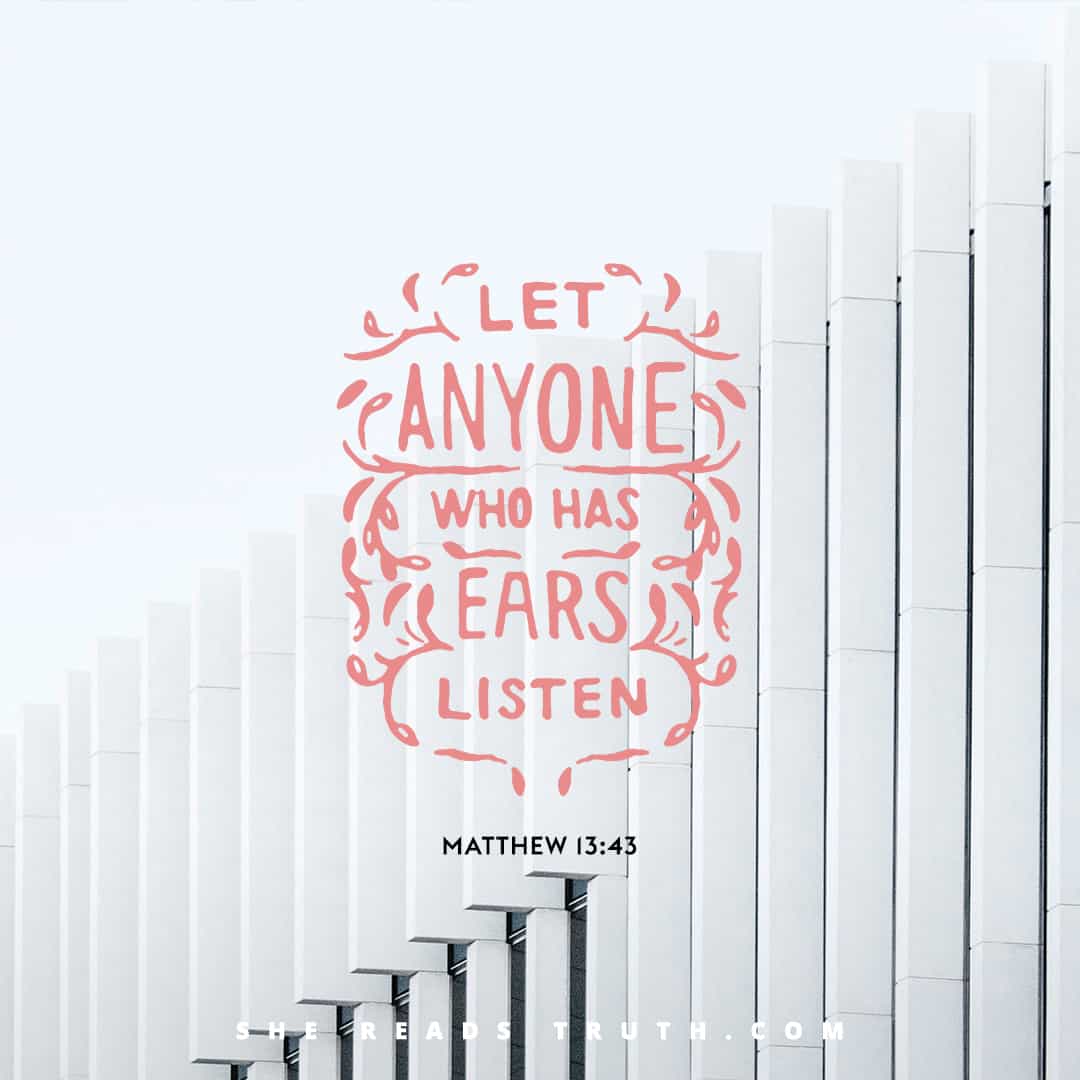The Wheat and the Weeds
Open Your Bible
Matthew 13:24-43
BY She Reads Truth
In this study of the Parables of Jesus, we are reading many of the stories Jesus used to teach hearers about how to live as His followers. Each day we’ll read parables in their immediate context, focusing on a different category of parables each week. Then we will work through a series of questions to understand the meaning of the text and take to heart the “secrets of the kingdom.”
Editor’s Note: In this Parables study, Jesus Himself is telling us stories—stories He wants us to reflect on and process. Rather than asking our writers to write their own stories about Jesus’ stories, we thought it would serve you and the text better to provide questions to help you dig into the meaning of each day’s parable. If you find a parable or passage particularly confusing, stop and pray. Ask the Lord to reveal Himself to you in His Word, and thank Him that we can know Him without knowing all the answers to our questions.
//
Week 1: Parables about God’s Kingdom
Parables are stories with a point. They are designed to make us think about what is being said, why, where, to whom, and in what context. To get to the heart of Jesus’ parables, we need to pull them apart and take a careful look at the details He gives us. One detail that runs through this week’s selection of parables is that Jesus says they all describe the kingdom of God in some way. As you read through these passages, use the following questions to unpack the stories Jesus tells.
//
Day 2 Reading: Matthew 13:24-43
Questions:
1. Jesus says the kingdom of God can be compared to the parable of the wheat and the weeds. How so?
2. What is the problem Jesus addresses in the parable of the wheat and the weeds, and what is the outcome of the story?
3. What is the central point of this parable?
4. How did Jesus explain this parable to His disciples? What is your response to Jesus’ explanation?
161 thoughts on "The Wheat and the Weeds"
-
I love how you got this from scripture as well!! It is SO true and that is why we have to retreat to be with God every day because we NEED him in order to continue loving and giving ourselves to the weeds, just as Jesus did on his life on earth. SO GOOD. Thank you for this.
-
It was very sweet reading the parable. My spirit sensed all of the elements of the story as I was reading it and I was moved and became emotional. The wheat is the sons of the Kingdom like Jesus explains, his ambassadors, us, are to seek righteousness and produce good things in our life and such a great encouragement which is why he explains it as such. And weeds, we know, are elements we do not want to find in our gardens because they kill all of our good and growing crops which is why it symbolizes evil and the devil. I think his central message is to give us a picture of what happens when we seek one life or the other.
-
I really enjoyed reading through all these different interpretations of this parable. It also made me think that God allowed the bad seed to grow along with the wheat as an example to the weeds. I feel God wanted the weed (bad people) to understand and see what it meant to be good!
My walk in my faith hasn’t been at its strongest and I feel reading Jesus’ words and especiallly these parables are helping me get back in track.
-
The parable of the wheat and the weed mirrors the happenings in paradise. Back then, God created Adam and Eve. They were perfect beings and also God gave them the gift of free will. Everything was good until Satan showed up in the form of a snake. Satan tempted Adam and Eve and succeeded. They were thrown out of paradise and also God told Satan that there will come an offspring (Jesus) who will set things right and punish him, – in my opinion, the field is the earth, the good sower is Jesus, the wheat the good news offered by God himself and the weed stands for the many temptations and sins Satan confronts us with. But because mankind still has the gift of free will God does not allow to rip out the weeds before the harvest of the wheat is due. To me, the harvest means the ultimate “cleaning” of today’s world. This can be found in the last book of the New Testament. The prophecy tells us what will happen when the time has come. All people will be judged according to their doings. We still have time to draw close to God. But once HE decides the time is over we will be judged. To me, that is the meaning of the parable.
-
I love that the parables can speak to us differently depending on what we’re experiencing in our own lives. How I relate to a parable today may be completely different than how I’ll receive it 4 years from now.
-
1. Jesus says the kingdom of God can be compared to the parable of the wheat and the weeds. How so?
The kingdom of God was created to be pure, but somehow evil got mixed into it.2. What is the problem Jesus addresses in the parable of the wheat and the weeds, and what is the outcome of the story?
Enemies came an sowed bad seed… he lets them grow with his wheat (followers) and at the end, it is distinguished between heaven and hell.3. What is the central point of this parable?
The central point of this parable is that we are living between evil and amongst evil, which may tempt us, and has tempted us to be evil as well. However, it will be determined in the end what is right and wrong, what is good and bad.4. How did Jesus explain this parable to His disciples? What is your response to Jesus’ explanation? It is a good explanation. But scary.
-
These are all beautiful interpretations I myself have trouble trying to understand theses parables but the cool thing God doesn’t expect you to know it all. It so amazing to just sit here in the presence of a perfect God. When you pray to him even about reading the bible he is here and showing you something that you can use for his glory.
-
This resonated so strongly with me. I too, have questioned why evil is allowed to exist. But through this parable, I realize that it is evil which makes the good stronger. It is through pain, loss, heartbreak, and devastation that we truly recognize the good in our lives and in ourselves. It forces us to rise up, hold strong in our faith, and come out as better Christians who believe in His plan – a bigger, more beautiful plan than even we could imagine for ourselves. The evil will be dealt with by God, and the good will inherit His kingdom. God is so so good!!



Post Comments (161)